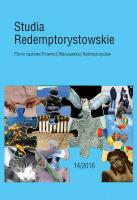Immanuela Kanta anatomia wojny
Immanuel Kant’s anatomy of war
Author(s): Zdzisław KieliszekSubject(s): Metaphysics, Ethics / Practical Philosophy, German Idealism, Peace and Conflict Studies
Published by: Warszawska Prowincja Redemptorystów
Keywords: Immanuel Kant; war; conflict; polemology; peace research;
Summary/Abstract: The following question appears often in the discussion: Is the world not on the eve of the Great War? There is another question: How to minimize the risk of its explosion? The paper Immanuel Kant’s anatomy of war aims to enrich the debate on the issue of war that is not raised. It is about bringing the Kantian proposal, how to minimize the risk of conflicts between people. Therefore we discuss the following issues. First of all, two methodological orientations have been presented in the study of war and peace. The first one consists in adopting a negative definition of peace, which is understood as the absence of war. This orientation is accepted in polemology (war science), scientific discipline, which was formed after the Second World War. The second one is characteristic for the trend of “peace research”. It consists in accepting a positive definition of peace, or describing it as a specific form of relationship between people and nations. The author argues that the methodological orientation adopted in polemology is more effective when it comes to learning about war and peace. War is a phenomenon, which causes, course, and consequences are relatively easy to describe conceptually. It is much more difficult to describe peace. Hence, according to the author, the way to know peace is through knowledge of the war, especially its causes. Secondly, key achievements of polemology are shown. Among them is the perception that the causes of the outbreak of conflicts are usually differences of interests between the parties. It can be concluded on this basis that the most appropriate way to prevent wars is to correlate the interests of individual nations or states. The polemologists are still looking for interests that should be taken first and foremost. The philosophy of Immanuel Kant, according to the author, can be used here. Third, Kant’s vision of the causes of people’s conflicts is shown. The German philosopher observes that the “unsociable sociability” is the fundamental source of human conflict. The point is – in the opinion of Kant – that a man in its nature is willing to cooperate with other people, but also at the same time the people are constantly in natural conflict. Fourth, the Kantian proposal of an antidote to the human tendency to conflict with others is presented. Kant suggests that this tendency can be successfully neutralized by appropriate upbringing, in particular moral education. Kant notes that for the first dozen years of life a person is extremely vulnerable to external educational influences. At the time, it is possible to form it in such a way that it can be among others honest, reliable and peaceful towards others. On this basis, the German philosopher postulates that the most appropriate way to avoid wars in the future is to properly and systematically educate the next generations. On the basis of the analysis, it can be said that the danger of the outbreak of war should be minimized not through political-economic agreements or military solutions, but by “morally raising” of the next generation to a sufficiently high level. So we have to take into account, in polemological studies and their correlated practical activities, the necessity of adequate moral education for successive generations as a proper means of preventing conflicts and wars.
Journal: Studia Redemptorystowskie
- Issue Year: 2018
- Issue No: 16
- Page Range: 97-113
- Page Count: 17
- Language: Polish

